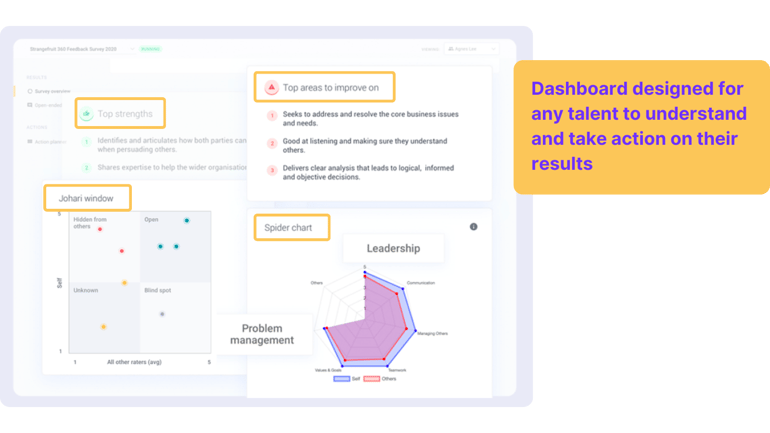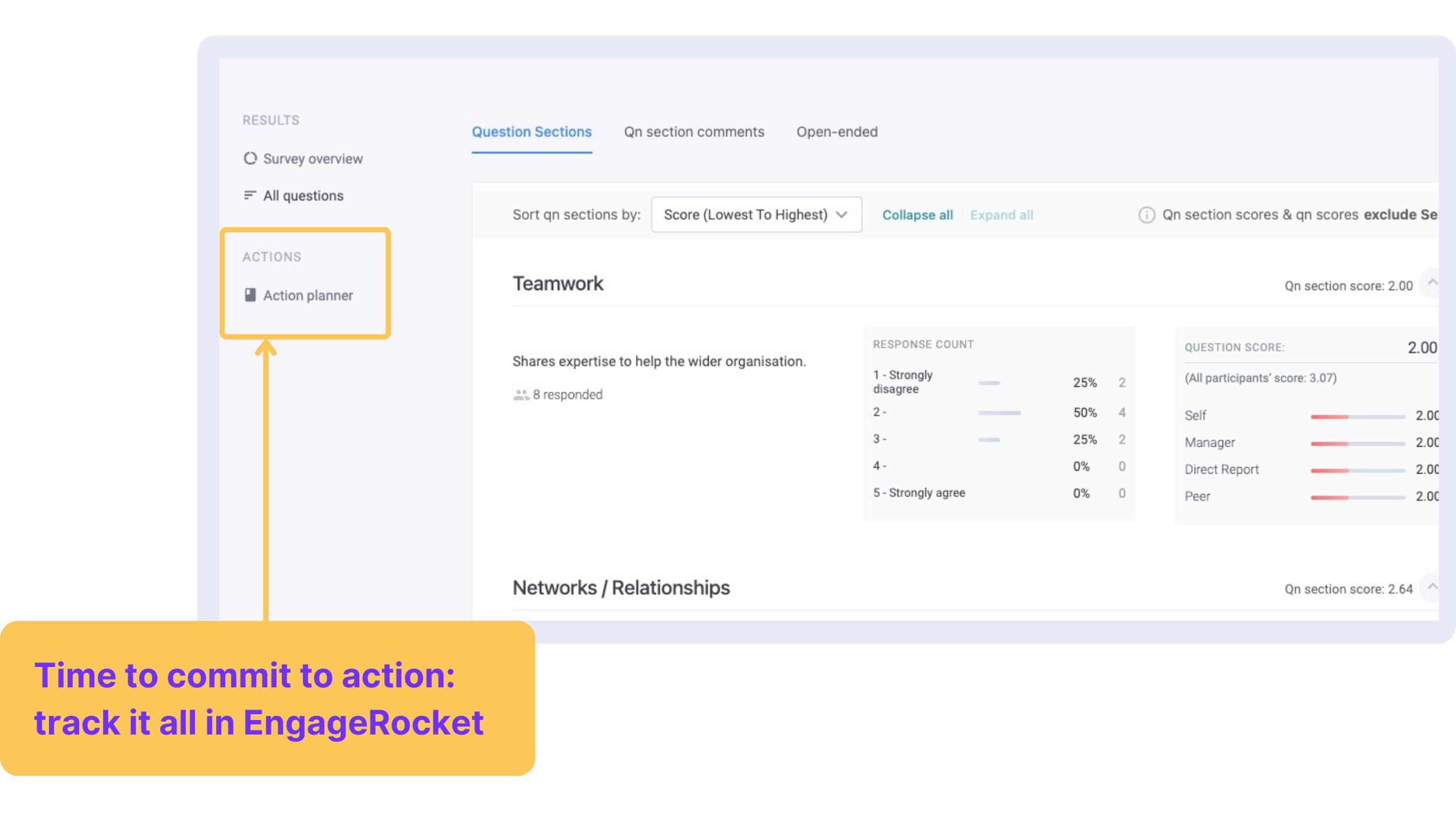The performance review season should not be a stressful time for employees. Instead, it should be a process that helps employees identify their areas for growth and become their best selves. The right performance review questions receive quality feedback that sparks concrete actions and puts out potential fires.
"Ask the right questions if you're to find the right answers."
— Vanessa Redgrave
This article discusses the best employee performance review question examples you can start using today! But first, let’s discuss what goes into the process of how to craft effective questions and some key considerations.
Table of contents
Guidelines for crafting effective performance review questions
40 Employee performance review questions
Simplify your performance review process with EngageRocket GROW
Guidelines for crafting effective performance review questions
While crafting performance review questions for employees, it’s important to be mindful of the messages you are giving out. Avoid asking questions that could come off as an accusation and trigger defensive answers. Those questions can damage employee engagement and business success as your people leave. On the other hand, research-backed questions are purpose-driven and provide clarity on an employee’s performance, development, and nurturing of the manager-employee relationship.
Here are some key points to consider before drafting a performance review questions template:
1. Prioritize questions based on employee roles
Tailor your performance review questions according to the specific roles within your organization. Work closely with different departments to develop role-specific questions tailored to sales, technical, marketing, and other teams. This ensures that managers, individual employees, and company leaders receive questions relevant to their responsibilities.
2. Identify criteria and KPIs to track for development plans
Implement a competency framework to identify and define essential skills required at different seniority levels.
3. Leverage smart analytics tools to optimize for success
Smart performance review tools provide a structured approach to assessing and developing employees' capabilities. Leverage tools like GROW to integrate company- and team-wide core competencies into your performance reviews and development plans.
4. Consider the review timeframe
Determine the focus of your questions based on the review timeframe. For quarterly or mid-year reviews, concentrate on recent achievements and upcoming support needs. For annual performance review questions, prioritize questions that align with longer-term goals and objectives.
💡Create a Winning Performance Management Framework & Best Practices:
Learn how to create a performance management framework, foster a culture of continuous feedback, and transform your organization. We will also discuss some secret tips to conduct comprehensive reviews successfully.
40 Employee Performance Review Questions
According to a study by Gallup, only 14% of employees feel that performance reviews motivate them to improve. The reasons behind this are an inefficient review system and a lack of connection between performance reviews and employee development.
To address this issue, EngageRocket has developed GROW, a platform that helps scale your people's growth with your business. It does the heavy lifting by providing research-backed question templates for employees, managers, and leaders. You can customize the questions, rater groups, and selection methods per your organizational goals.
We are listing here the top performance review questions for individual employees, people managers, and senior management.
💡 Expert Tip:
Your review questions should always be a mix of open-ended and close-ended (e.g., 5-point Likert scale) questions across different areas.
1. Questions for individual contributors
On a 5-point scale, rate how well the employee performs on various competencies as an individual contributor:
- Integrity and trust: How well do you believe other colleagues respect this employee? (1 = Not respected, 5 = Highly respected)
- Communication: How effectively does this employee conduct or contribute to meetings? (1 = Ineffective, 5 = Highly effective)
- Planning: How well does this employee identify and focus effort on top priorities? (1 = Poor, 5 = Excellent)
- Problem management: How effective is this employee at identifying problems, breaking them down, and proposing solutions? (1 = Ineffective, 5 = Highly effective)
- Teamwork: To what extent does this employee encourage teamwork and cooperation among departments and coworkers? (1 = Rarely, 5 = Consistently)
2. Questions for people managers
These close-ended performance review questions can give new insights into your employee’s people management capabilities.
- Business acumen: How effectively does this employee set clear direction that aligns their team with the organization's strategy? (1 = Ineffective, 5 = Highly effective)
- Managing others: How well does this employee help others generate alternative solutions to problems or issues? (1 = Rarely, 5 = Consistently)
- Leadership: How effectively does this employee delegate responsibilities and tasks? (1 = Ineffective, 5 = Highly effective)
- Recognition: How often does this employee find ways to celebrate accomplishments? (1 = Rarely, 5 = Frequently)
- Self-awareness: To what extent does this employee keep control of their emotions and behavior, even in high-pressure situations? (1 = Rarely, 5 = Always)

EngageRocket’s GROW - 360 feedback and peer review tool dashboard
3. Questions for senior management
These closed-ended questions are based on a 5-point Likert scale rate of how well the employee performs on various competencies at a senior management level.
- Communication: How effectively does this employee communicate to those within the organization what the future will look like? (1 = Ineffective, 5 = Highly effective)
- Values and goals: To what extent has this employee established plans and strategies to help us achieve company goals? (1 = Little to none, 5 = Comprehensive)
- Planning: How well does this employee create short-term goals that fit the organization's long-term strategy? (1 = Poorly, 5 = Excellently)
- Business acumen: How clearly does this employee articulate a growth strategy for the business? (1 = Unclear, 5 = Very clear)
- Leadership: How willing is this employee to take risks, having considered the likelihood, impact, and opportunities for mitigation? (1 = Not willing, 5 = Very willing)
4. Questions for strengths vs improvement
We recommend you avoid asking simple Yes/No or rater-scale questions to learn about employee strengths and improvement areas. Be mindful when you frame the questions about their shortcomings or missed opportunities as it could cause the employees to be defensive. Here are some open-ended questions to gain deeper insights into your employee's potential:
- Strengths: What core strengths help you do your job effectively?
- Fit: What skills make you the best fit for your position?
- Undisplayed skills: Which skills haven’t you yet been able to showcase at work?
- Inspiration: What type of work inspires you the most?
- Ease: What kind of work comes easiest to you?
- Missed opportunities: What were your biggest misses this year?
- Reflection: What factors contributed to these misses?
- Improvement: What strategies will you employ to improve in the future?
- Support: How can we help you prevent similar misses in the future?
- Development focus: Which areas do you intend to concentrate on for growth in the upcoming [period]
- Professional growth assistance: How can we facilitate your professional development and advancement?
5. Questions for current role vs future growth
These open-ended questions assess how employees perform in their current roles, what they like and dislike, and project how their performance can be improved. Similarly, get specific and avoid asking vague questions that can be answered with just a Yes/No.
- Task preferences: Which job responsibilities/tasks bring you the most satisfaction? Conversely, which ones do you find less enjoyable?
- Role contribution: How do you believe your role directly contributes to the company's success?
- Role satisfaction: What aspects of your current role do you find most and least fulfilling?
- Company appreciation: What aspects of working for this company do you appreciate the most?
- Professional goals: What are your primary professional objectives for the upcoming period?
- Career aspirations: What position are you aiming for following, and what qualifications do you possess that align with that role?
- Development interests: What areas of professional development are you eager to explore in the upcoming [period]?
- Challenges ahead: What challenges do you anticipate or are currently facing, and how can we provide assistance?
- Career growth preferences: What form of career growth is most significant for you (e.g., leading a team, personal skill development, exploring different domains)?
6. Questions for overall performance
The performance review questions below assess the overall performance of the employees.
- Accomplishments: What achievements are you proud of since our last performance review?
- Motivation: What factors drive you to excel in your role and remain productive?
- Job enjoyment: How can we enhance job satisfaction and make work more enjoyable?
- Future goals: What are your aspirations and targets for the period leading up to our following performance review?
- Goal achievement: Which objectives were successfully met and which remained unaccomplished?
Simplify your performance review process with EngageRocket GROW
Even if you have a set performance review template or framework, there's still a lot of room for managers to have a more bespoke and add a personal approach that persists through cycles and organizational changes.
Transforming your performance review framework demands not just asking the right questions but also a deep understanding of employee dynamics. This is where GROW helps you automate appraisals and review processes so you can spend less time developing these reviews and more time developing high-performing employees.
EngageRocket’s GROW allows for real-time 360 evaluation of employees. It offers actionable insights to managers to develop their workforce.

Want to learn how GROW can supercharge individual and team development? Book a call with us today!
FAQs
1. What is a good question for a performance review?
Some examples of good performance review questions can be:
- Open-ended: What achievements this quarter are you most proud of?
- Open-ended: What makes you the best fit for your position?
- Close-ended: On a scale of 1-5, how likely is this employee to prioritize their workload effectively and meet deadlines?
- Close-ended: On a scale of 1 to 5, how would you rate this person's leadership skills?
2. What are the 5 most meaningful questions to ask in a performance review as a leader?
Here are the 5 most meaningful questions to ask in a performance review as a leader:
- How do you feel about your current role and responsibilities?
- What accomplishments are you most proud of since our last performance review?
- What challenges have you encountered, and how can we help you overcome them?
- How can we help you achieve your professional goals and further develop in your role?
- What feedback do you have for me as your leader, and how can I better support you moving forward?
3. What are the core questions of performance reviews?
Core questions of performance reviews have a clear intention and purpose. They can be both open-ended or close-ended depending upon why you’re asking it and what you want to achieve with the answer.

.png)
.png?width=770&height=289&name=CTA-Banner-Blog%20(1201%20%C3%97%20450px).png)

 .
. 